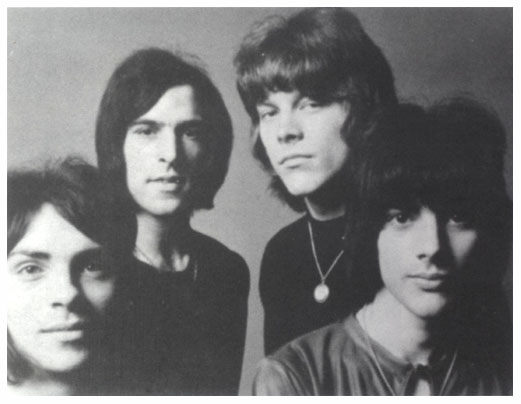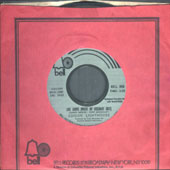|
Edison Lighthouse Bell 858 March 1970 Billboard: #5
Tony (b. Apr. 14, 1942, Exeter England), Jeff and the two Rogers recorded for Donegal and Pye as the Kestrels; there were no more major hits. One of their publicly passed-over sides was the Beatles' "There's a Place," a tune Burrows claims was given to them by the Fab Four. "We toured with the Beatles in England till about '65. It was the most extraordinary time; the likes not seen before or since... It was a great time to be alive; all was absolutely mad... That time is locked in my memory."
Later, as a member of the psychedelic band Flowerpot Men, Burrows had a British hit in 1967 with "Let's Go to San Francisco." Flowerpot Men follow-ups failed to sufficiently freak people, and with a decade of barrooms and ballrooms behind him, Tony called it quits and returned to what promised to be a sedate life with his wife and daughter. But writer/producer Tony Macaulay -- composer of The Flying Machine's "Smile a Little Smile for Me" and the Fifth Dimension's "(Last Night) I Didn't Get to Sleep at All" -- needed a session singer to bring to life a bubblegummy tune he co-wrote with Barry Mason called "Love Grows (Where My Rosemary Goes)," so he approached Burrows. "Love Grows" was dashed off in 40 minutes in his London apartment, with Macaulay playing guitar, recalled Mason -- also the creator of "Delilah," "Here It Comes, Again," "Kiss Me Goodbye" -- to liner-note writer Gordon Pogoda. Once "Love Grows" and the Edison Lighthouse name were on the charts, Macaulay faced the same problem that had plagued every packager of studio groups: finding a band that would tour under the moniker on the label. After auditioning 35 or more acts, Macaulay settled on guitarists Ray Dorsey and Stuart Edwards, bassist David Taylor, and drummer George Wayman. Together, these musicians had been appearing as the Greenfield Hammer. A few more poorly-charting Edison Lighthouse 45s were issued, but after the mild success of "It's Up to You Petula" (#72, 1971), the Edison Lighthouse name was retired and Dorsey and the rest of his crew reverted to being Greenfield. However Macaulay was so impressed with Burrows' vocal abilities that he signed him to a solo contract with Bell Records. Two years' worth of 45s issued under Tony's own name did so poorly that in 1974, Burrows returned to working sessions. His only US charting single as Tony Burrows, "Melanie Makes Me Smile," peaked at number 87 in 1970. As a member of The First Class, yet another pseudo-group of studio players, Burrows mounted the charts for a final Stateside time when the Beach Boys-esque "Beach Baby" nearly topped the Billboard Hot 200 pop chart in 1974. The seemingly tireless Burrows continued to do demos for Vanity Fare ("Hitchin' a Ride") and Paper Lace ("The Night Chicago Died") and session work for artists like Elton John ("Levon," "Tiny Dancer"), Tom Jones, Engelbert Humperdinck, Alan Price, Cliff Richard, Chris Spedding, and Kiki Dee. Tony's voice is also heard on the initial "I'd Like to Teach the World to Sing" Coca-Cola commercial. Of note, the accompanying female voices on "Love Grows" were those of the recording act Sue & Sunny (a.k.a. Sandra Stevens and Heather Winkland), the girls heard on the Brotherhood of Man's "United We Stand." In 2011, Burrows, pictured first from left here, was awarded the Gold Badge Award by the Ivors Academy, one of the largest professional associations for music writers in Europe, in recognition of his contribution to music. He continues to write, produce, sing commercials and do voice-overs. - Wayne Jancik, The Billboard Book of One-Hit Wonders, Billboard, 1998. |


